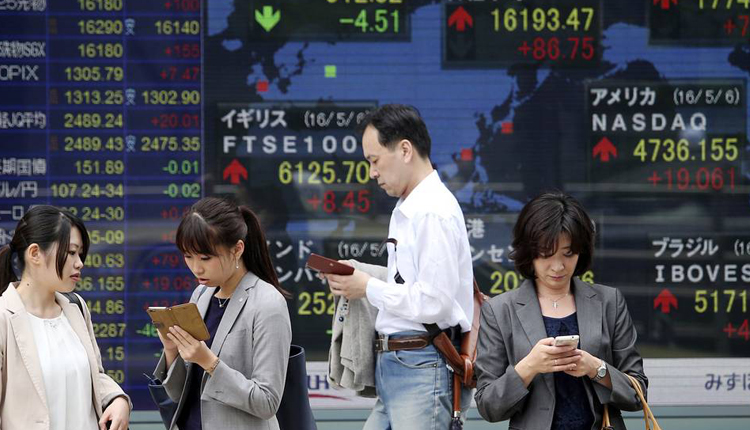Asian stocks slid on Monday as investor sentiment took a hit amid the renewed slump in the Turkish lira.
The Nikkei 225 slid 1.68 percent as the yen firmed amid uncertainty in Turkey. The safe-haven currency traded at 110.27 to the dollar at 1:30 p.m. HK/SIN, compared to levels around 110.90 seen on Friday.
That, in turn, saw exporter stocks turn lower, with automakers and electric appliances taking a hit. Toyota Motor declined 1.68 percent and Canon lost 2.14 percent. The sea transport subindex led losses, with the sector sinking 3.38 percent, amid broad declines.
Chinese shares were also dented, with the Shanghai Composite losing 1.34 percent and the blue-chip CSI 300 index down 1.47 percent. Hong Kong’s Hang Seng Index, meanwhile, fell 1.54 percent as all sectors recorded steep declines.
Elsewhere, the Kospi eased 1.52 percent as tech stocks extended recent declines, with heavyweight Samsung Electronics pulling back by 0.88 percent. Over in Australia, the S&P/ASX 200 recorded slimmer losses, with the index last trading lower by 0.44 percent.
Markets in Thailand were closed on Monday for a holiday.
MSCI’s index of shares in Asia Pacific excluding Japan were down 1.57 percent in Asia afternoon trade.
Top of mind for investors has been the sell-off in the Turkish lira, which extended its declines on Monday.
The lira edged past the 7.00 level to the dollar to touch a new record low but later pared some losses to last trade at 6.7174, down some 4.5 percent against the greenback after the Turkish central bank announced measures to bolster the currency during Asia afternoon trade.
The currency had taken a knock on Friday when U.S. President Donald Trump said he had approved the doubling of metals tariffs against Turkey. The lira briefly slumped 20 percent in the previous session after the announcement, before ending the last session down by some 16 percent.
Despite the cautious tone in markets, contagion risk for the turmoil in Turkey was seen as less of a significance for Asia.
“The first five months of this year, [the lira] was down 20 percent. That didn’t rattle the markets. It was the sudden move last week that resulted in this fear of a contagion and I think some of those fears are misplaced, to some extent,” Vasu Menon, vice president of group wealth management at OCBC Bank, told CNBC’s “The Rundown.”
“It’s not fair to generalize across the emerging market space because you’ve got the good apples and the bad apples. And I think here in Asia, you’ve got more good apples than bad apples,” Menon added.
The moves lower in Asia also came after U.S. stocks dropped on Friday amid the Dow Jones Industrial Average declined 0.77 percent, or 196.09 points, to close at 25,313.14 and also erasing its gains for the month. Other U.S. indexes also notched declines of a similar magnitude.
Markets in Europe were also affected by the ongoing turmoil in Turkey, with investors concerned about the contagion effect of lira’s steep fall on banks in the region. The pan-European Stoxx 600 fell more than one percent in the end of that session.
On the commodities front, oil prices slipped after gaining in the previous session on the back of concerns over supply. Brent crude futures eased 0.27 percent to trade at $72.61 per barrel and U.S. West Texas Intermediate crude inched lower by 0.03 percent to $67.61.
In individual movers, Lotte Shopping tumbled 6.85 percent after the South Korean retailer reported a 17 percent decline in second-quarter profit, compared to one year ago.
Meanwhile, shares of China Huarong Asset Management dropped 5.13 percent in Hong Kong after the company issued a profit warning on Sunday, stating that it expected a “prominent decrease” in net profit for the six months ending June 30.
Source: CNBC


